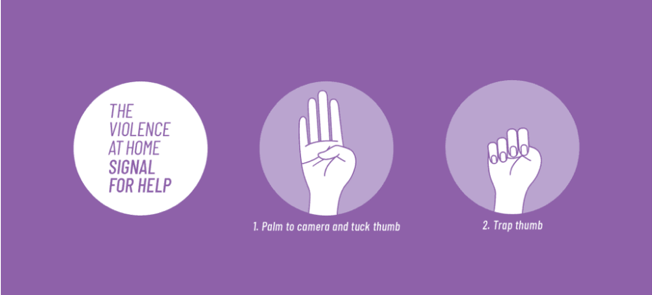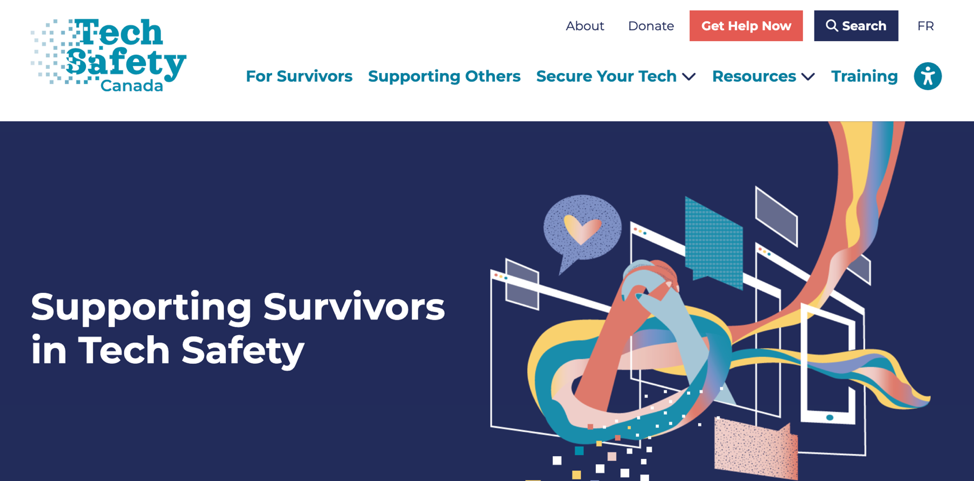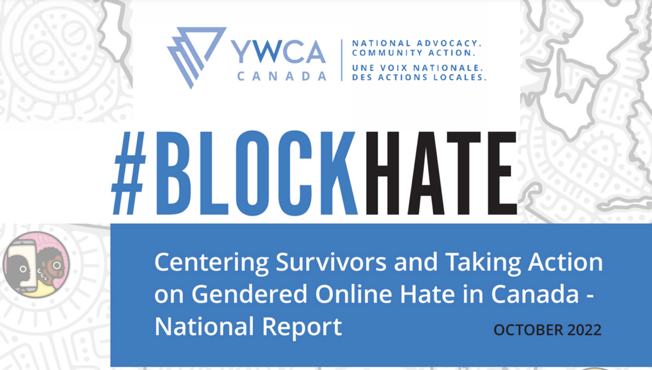
By Jane Bailey
This installment of the eQ blog series relating to the 2023 UNCSW considers some of the amazing feminist work being done to address to tech-facilitated violence (TFV) through both technological and policy reform initiatives. It focuses in particular on initiatives showcased in a Canadian-hosted event entitled “The Signal for Help: Innovation to Shift from Stigma to Support” which took place on Friday March 10 at Canada’s Permanent Mission to the UN in New York. The panel featured Canada’s Minister of Women and Gender Equality (WAGE) and Youth Marci Ien, Paulette Senior (Canadian Women’s Foundation (CWF)), Mariam Torosyan (Safe You), Raine Liliefeldt (YWCA Canada), Rhiannon Wong (Women’s Shelters Canada (WSC)), and Rosel Kim (Women’s Legal Education and Action Fund (LEAF)).
Tech-facilitated violence is a critical impediment to full, free and equal participation by cis and trans women and girls and gender diverse people in our digitally networked environment. A recently released CIGI report entitled Supporting Safer Digital Spaces based on surveys administered in 18 countries found that:
- nearly 60% of respondents had experienced online harms and 25% of them believed they were targeted because of their gender identity;
- almost 30% of respondents who had experienced online harm and who identified as transgender or gender-diverse “reported severe impacts to their mental health, including their desire to live”; and
- almost 30% of women reported negative mental health effects, and 23% “felt they could no longer engage freely online” after the online harms they had experienced.
Gender-based TFV (GBTFV) has also become a prominent component of domestic violence, with 2022 WSC data showing that 96% of Canadian domestic violence shelter survey respondents had served women who had experienced GBTFV and a 2021 BC Society of Transition Houses data showing that 89% of anti-violence service survey respondents had supported women, children and youth who had experienced TFV.
Findings like these illustrate the ways in which technology is being used to deepen and intensify the longstanding global crisis of gender-based violence, a crisis that was exacerbated by the COVID 19 pandemic. Unsurprisingly, the proliferation of TFV has provoked urgent calls for technological and policy responses, as well as changes in corporate policies and practices that promote such content. Community-serving organizations are playing a critical role in advancing these calls, in developing resources to support cis and trans women and girls, and gender-diverse people targeted by TFV, and in engaging in policy reform processes aimed at addressing TFV. Initiatives by some of these change-making organizations were showcased at the UNCSW on March 10th, including:
- Signal For Help, created by CWF and launched in April 2020 in response to alarming increases in domestic violence associated with self-isolation measures imposed during the COVID-19 pandemic, is a “one-handed gesture someone can use [during a video conference for example], without leaving a digital trace, to communicate they need someone to safely check in and support them.” The signal has been widely promoted via TikTok and praised in mainstream media as a timely response to a growing crisis. CWF also offers training material online for those who wish to become Signal for Help responders.
- Safe You, created by Miriam Torosyan, an IT professional and CEO of the Impact Innovations Initiative in Armenia, is “a multi-stakeholder mobile application and platform … designed to empower and protect women and girls from violence, as well as raise awareness on key gender-based issues”. The app gives users in Armenia, Iraq and Georgia access to emergency assistance, free forum discussion groups with professionals, safe spaces for peer-to-peer dialogue and updated information on places to seek help.
- Techsafety.ca is a website showcasing the Tech Safety Canada Project undertaken by WSC and funded by WAGE Canada. The Tech Safety Project includes numerous components, including tech safety resources, training for anti-violence workers on the issue of TFGBV, and engaging with tech and communications corporations on their tech safety practices. Launched in 2023, the website’s resources to date include plain language toolkits on Technology Privacy and Safety, Legal Remedies for TFGBV, Tech Safety Planning and Preserving Digital Evidence and build on the work of the BC Society of Transition Houses, WESNET, and the National Network to End Domestic Violence.
- #BLOCKHATE, a 2022 YWCA Canada report on the results of national surveys and focus groups with young women and gender-diverse people aged 16-30 relating to experiences with and responses to online hate, offers survivor-centred, community-generated solutions for meaningfully responding to online hate including advocacy and awareness, accountability, support, and regulatory responses. As part of its advocacy and awareness-raising efforts, YWCA Canada collaborated with the Canadian Race Relations Foundation to launch a #blockhate social media campaign.
- LEAF’s TFV Project – brings together feminist lawyers and academics to conduct research relating to TFV, and to bring an anti-oppression feminist lens to bear on policy reform issues relating to technology. Related initiatives have included a Supreme Court of Canada intervention relating to voyeurism, commissioning and publication of the in-depth, world-class Deplatforming Misogyny Report (written by Cynthia Khoo) analysing platform liability for GBTFV, and important policy submissions relating to online hate, and police use of facial recognition technology.
In addition to highlighting these and other innovative technology and policy reform proposals aimed at addressing TFV, the March 10th panel also generated excellent discussion, raising both direct pragmatic questions, as well as more philosophical issues about TFV and the degree to which it is or is not taken seriously. For example, why don’t telecom companies except those victimized by intimate partner violence and/or GBTFV from having to pay expensive charges for obtaining new phone numbers or getting out of expensive phone contracts as a means of supporting them in escaping such violence? Would characterizing TFV as a matter of cybersecurity lead to it being taken more seriously and prompt more expeditious responses from policymakers?
One thing that was clear from this UNCSW panel – feminist community organizations have much to be proud of when it comes to making meaningful, survivor-centred contributions in the fight against TFV. When will the federal government step up to do its part?
Sources:
Aikenhead, Moira, Suzie Dunn and Rosel Kim, “LEAF Submission to Canadian Heritage on the Federal Government’s Proposed Approaches to Address Harmful Content Online” (25 September 2021), online: https://www.leaf.ca/wp-content/uploads/2021/09/2021-09-25-LEAF-Submission-re-Harmful-Online-Content.pdf.
Bailey, Jane. “Tales from the Feminist Olympics Part 2: AI, Ethics and Equality”, online: https://www.equalityproject.ca/blog/tales-from-the-2023-feminist-olympics-part-2-ai-ethics-and-equality/.
BC Society of Transition Houses, “Technology Safety”, online: https://bcsth.ca/project/technology-safety/.
Bobb, Brooke. “’Signal for Help’ Is a New Tool for Abuse Victims During the Coronavirus Lockdown and Beyond”. Vogue (28 April 2020), online: https://www.vogue.com/article/signal-for-help-womens-funding-network-abuse-coronavirus.
Canada. Permanent Mission of Canada to the United Nations in New York City, online: https://www.international.gc.ca/world-monde/international_relations-relations_internationales/un-onu/new-york.aspx?lang=eng.
Canadian Women’s Foundation, online: https://canadianwomen.org/?gad=1&gclid=EAIaIQobChMIvo-OsNLh_wIVme3jBx2pMA3UEAAYASAAEgJXf_D_BwE.
Canadian Women’s Foundation, “Become a Signal for Help Responder”, online: https://canadianwomen.org/signal-for-help/?gad=1&gclid=EAIaIQobChMImvzK1N3h_wIVNRFMCh2JSwCdEAAYASAAEgKvJ_D_BwE.
Canadian Women’s Foundation, “Become a Signal for Help Responder: Action Guide”, online: https://action.canadianwomen.org/signal-responders.
Centre for International Governance and Innovation, “Tech-facilitated gender-based violence is an international, human rights concern, finds new research” (8 June 2023), online: https://www.cigionline.org/articles/tech-facilitated-gender-based-violence-is-an-international-human-rights-concern-finds-new-research/.
Dunn, Suzie, Tracy Vaillancourt and Heather Brittain, Supporting Safer Digital Spaces (CIGI, 8 June 2023), online: https://www.cigionline.org/publications/supporting-safer-digital-spaces/.
Khoo, Cynthia, Deplatforming Misogyny: Report on Platform Liability for Tech-facilitated Gender-based Violence (Toronto: Women’s Legal Education and Action Fund, 2021), online: https://www.leaf.ca/wp-content/uploads/2021/04/Full-Report-Deplatforming-Misogyny.pdf.
National Network to End Domestic Violence, “Safety Net Project”, online: https://www.techsafety.org/.
Safe You: Virtual Safe Space for Women, online: https://safeyou.space/en.
Technology Safety Canada, “Legal Remedies for TFGBV Toolkit”, online: https://techsafety.ca/resources/toolkits/legal-remedies.
Technology Safety Canada, “Preserving Digital Evidence Toolkit”, online: https://techsafety.ca/resources/toolkits/preserving-digital-evidence-toolkit.
Technology Safety Canada, “Technology Privacy and Safety Toolkit”, online: https://techsafety.ca/resources/toolkits/the-technology-safety-and-privacy-toolkit.
Technology Safety Canada, “Tech Safety Planning”, online: https://techsafety.ca/resources/toolkits/tech-safety-planning-toolkit.
Thomasen, Kristen, Suzie Dunn, Kate Robertson, Pam Hrick, Cynthia Khoo, Rosel Kim, Ngozi Okidegbe, and Christopher Parsons, “Submission to the Toronto Police Services Board’s Use of New Artificial Intelligence Technologies Policy – LEAF and The Citizen Lab” (15 December 2021), online: https://papers.ssrn.com/sol3/papers.cfm?abstract_id=3989271.
UN Women, “Gender based violence: women and girls at risk”, online: https://www.unwomen.org/en/hq-complex-page/covid-19-rebuilding-for-resilience/gender-based-violence?gclid=EAIaIQobChMIxtDb-Nfh_wIVyiKzAB2l7AFPEAAYASAAEgJpdvD_BwE.
WESNET, “Technology Safety Project Australia”, online: https://techsafety.org.au/.
Women’s Legal Education and Action Fund, online: https://www.leaf.ca/.
Women’s Legal Education and Action Fund, “LEAF’s Technology-Facilitated Violence Project”, online: https://www.leaf.ca/project/tfv/.
Women’s Legal Education and Action Fund, “R v Jarvis: case summary”, (2019) online: https://www.leaf.ca/case_summary/r-v-jarvis-2019/.
Women’s Shelters Canada, online: https://endvaw.ca/.
Women’s Shelters Canada, “About Tech Safety Canada”, online: https://techsafety.ca/about, and https://techsafety.ca/.
YWCA Canada, online: https://ywcacanada.ca/donate/?gclid=EAIaIQobChMIvLPxvdLh_wIV3CezAB14kQm5EAAYASAAEgKA3fD_BwE.
YWCA Canada, #Blockhate: Centering survivors and taking action against gendered online hate in Canada: national report. (October 2022), online: https://ywcacanada.ca/wp-content/uploads/2022/11/Block-Hate-Report-October-2022-corrected-1.pdf.




